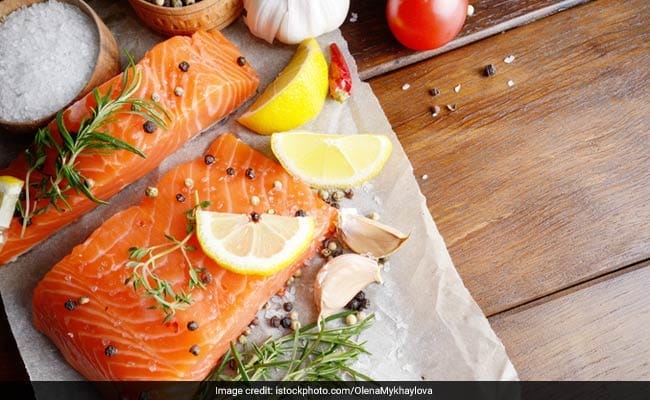Breast Cancer Awareness Month 2020: According to studies, consuming a healthy diet can help fight breast cancer risk factors. Read here to know from nutritionist some dietary changes you must make today!

Breast Cancer Awareness Month 2020: Consume a balanced diet for optimum nutrient intake
HIGHLIGHTS
- The month of October is observed as Breast Cancer Awareness Month
- Breast cancer can affect both men and women
- A healthy diet and lifestyle can help you reduce breast cancer risk
Breast Cancer Awareness Month 2020: Breast cancer is the first leading cause of cancer deaths among women and less common among men. Evidence suggests a greater number of risk factors that causes breast tumour are linked to nutrition and lifestyle (obesity, eating pattern, and alcohol consumption). Hence, good nutrition may reduce the incidence of breast cancer and the risk of breast cancer progression or recurrence by controlling the various risks factors. In this article, here are some diet recommendations which every woman need to know.
Breast Cancer Awareness Month 2020: Diet to follow
What is a healthy meal plate?
- Fill your plate with approximately 50% (or more) vegetables, 25% (or more) protein, and up to 25% or a lesser amount of starchy vegetable or whole grain as prescribed by your dietitian.
- 1 or 2 fruits daily as a snack or dessert
- A plant-based diet is highly recommended with dals, sprouts, beans, unpolished cereals and millet.
Also read: Breast Cancer Awareness Month 2020: Early Detection Can Help Save Lives, Here's How
Reach out to healthy fats:
- Good fats from cold-water fish, chia seeds, flaxseeds, sunflower seeds, walnuts, olive oil, avocados, rice bran oil, nut or oilseed based oils to be consumed regularly
- Increasing your intake of fish to 2- 3 times per week
- Include omega 3, 9 such as nuts, avocado, fish, oilseeds in your diet
- Limit and wisely use omega 6 containing oils like red meat, sunflower oil, and whole milk
- Limit the intake of highly saturated foods such as red meat, organ meat, cheese, sausages/processed meat, butter, ice cream
- Decrease foods containing trans-fatty acids, such as commercially prepared baked goods, packed snacks, and use of hydrogenated fats
- Do not repeatedly use or heat oils
- Research has suggested that these healthy fats may inhibit the growth of breast tumors so do not exclude them

Include healthy fats to your diet like omega-3 fatty acids
Photo Credit: iStock
Do not miss these-
- Increase your intake of poultry, fish, and vegetarian proteins (legumes and lentils)
- Include protein with every meal/snack
- Add antioxidants & vitamin A, C, E, selenium to your diet: Some have chemo-preventive properties that contain phytonutrients, antiestrogenic that fights against the cancer-causing cells from multiplying further in the body, reduce oxidative stress, inflammation and changing the epigenome such as:
- Carotenoids: dark yellow/orange/green vegetables and fruits
- Lycopene: tomatoes, grapefruit, watermelon
- Phenolic compounds: garlic, green tea, onions, shallots, dark leafy veg
- Glucosinolates, isothiocyanates, sulforaphane, and indoles: cabbage, cauliflower, broccoli, mustard leaves, sprouts
- Curcumin: ensure turmeric in your daily cooking
- Selenium source brazil nuts, seafood, and Vitamin C containing foods like amla, kiwi, guava, capsicum
Also read: Breast Cancer Awareness Month 2020: How Is Breast Cancer Diagnosed? Expert Explains
Remember these!
- Include micro greens regularly harvested from your kitchen garden.
- Keep enemies off your shopping list such as refined flours/sugars/polished grains.
- Factors that increase the risk of breast cancer: high intake of pickled/processed foods/ caffeine, regular consumption of smoked/charred/grilled foods, and cooking at high temperature (>300 degrees F).
- Soy supplements are not recommended but natural sources can be used as advised.
- Check and keep your Vitamin D levels at normal.
- Food safety guidelines to be followed if you have a weakened immune system or while chemotherapy. Wash and clean foods thoroughly during preparation. Do not consume raw and undercooked foods while dining out.
- Foods mentioned in the above list needs to be prescribed by Dietitian and anything excess or less always carries a risk.
- Regularly assess your body fat percentage and maintain healthy body fat, muscle, bone mass, and good basal metabolic rate with a reduced waistline.
- Limit the consumption of alcohol & quit smoking: research suggests that alcohol consumption equivalent to 3-4 standard drinks or more per week is associated with the risk of breast cancer recurrence, particularly among postmenopausal and overweight/obese women who bring out specific epigenetic changes and interacts with the medicines.
- Add adequate fluids at least 1.5 - 2lt of water daily and if you feel nauseated drink ginger ale or chilled fluids.
- Physical activity reduces the risk of breast cancer hence exercise regularly
Also read: Breast Cancer Awareness Month: Warning Signs, Stages And Risk Of Breast Cancer In Both Men And Women
(Ms. Edwina Raj, Senior Dietitian, Aster CMI Hospital)
Disclaimer: The opinions expressed within this article are the personal opinions of the author. NDTV is not responsible for the accuracy, completeness, suitability, or validity of any information on this article. All information is provided on an as-is basis. The information, facts or opinions appearing in the article do not reflect the views of NDTV and NDTV does not assume any responsibility or liability for the same.
DoctorNDTV is the one stop site for all your health needs providing the most credible health information, health news and tips with expert advice on healthy living, diet plans, informative videos etc. You can get the most relevant and accurate info you need about health problems like diabetes, cancer, pregnancy, HIV and AIDS, weight loss and many other lifestyle diseases. We have a panel of over 350 experts who help us develop content by giving their valuable inputs and bringing to us the latest in the world of healthcare.














